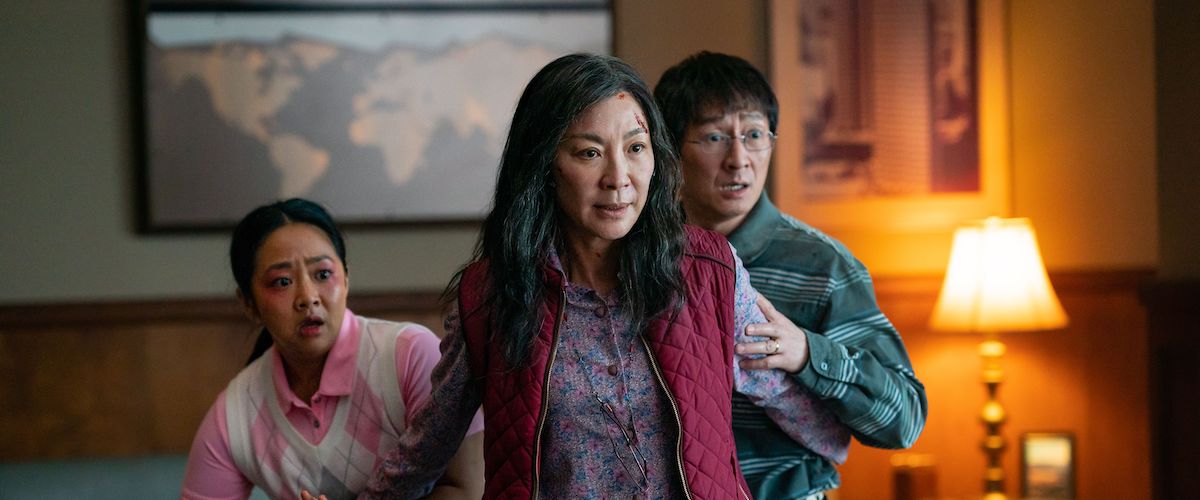
If you are a person who enjoyed, even admired Everything Everywhere All at Once, but didn’t looove it, consider this your safe space. Ever since the film made its debut at SXSW in March, response has been rapturous. People were calling it a masterpiece, an instant classic, and suggesting the film could do your taxes, fix you breakfast in bed, and save cinema all at the same time.
Well, not quite. The truth is, Everything Everywhere All at Once is a very good version of a type of film—the type that is meta, knowing, hip, and moves at a breakneck pace. The films I would compare it to are Edgar Wright’s Scott Pilgrim vs. the World or The Lego Movie. Both good films! But sometimes all that cleverness can be exhausting.
Here’s the premise: Evelyn (the great Michelle Yeoh) is leading a rather unremarkable life. She and her husband, Waymond (Ke Huy Quan), live above the laundromat they own. Her marriage has become loveless, she’s very withholding toward her lesbian daughter, Joy (Stephanie Hsu), and, to make matters worse, she’s being audited by the IRS. Her father (James Hong), who disapproved of both her marriage to Waymond and her move to America, is arriving from China and she has plans to throw him a big party. But first they must go to the IRS, and meet with the humorless auditor, Deidre (Jamie Lee Curtis).
While in the elevator on the way to see Deidre, Evelyn experiences a mysterious jolt and her husband suddenly turns into a different person—a kind of suave, cool superspy who explains to Evelyn that he is another version of Waymond from a different universe. Indeed, there are multiple versions of Waymond and Evelyn and Joy living in infinite timelines across the universe. What’s more, the universe is on the verge of destruction and only Evelyn and her very special set of skills can save the planet. Throughout the course of the film, Evelyn zaps in and out of various timelines—in one, she’s a martial arts superstar, not unlike Yeoh herself. In another, she’s one of those people who hawks products with an unwieldy sign on the side of the road (this skill is utilized in an amusing way). In various other universes, she’s a (literal) rock at the edge of a cliff and a knife-wielding chef. In the film’s most bizarre (but strangely touching) conceit, in one universe, mankind has dangling hot dogs instead of fingers. In that timelines, she’s a lesbian, and her lover is the none other than Deidre, who performs “Clair Du Lune” on the piano with her toes.
So yes, we’re talking about a metaverse here, suddenly the hottest thing in all of cinema. All the Marvel characters live in a metaverse, where multiple timelines are playing out all at once (this allows the studio to create tons of IP without worrying about chronological logic). The X-Men are in a metaverse. And, of course, The Matrix is one of the OG metaverse films.
And this is one of my issues with Everything Everywhere All at Once. Someone on Twitter said that if you are upset with the corporatized Marvel and D.C. Comics product, you should get your ass to the cinema to see bold, original filmmaking like this. I don’t entirely disagree—it is original!—but I still see this film as a subset of that kind of movie. No doubt, it has way more creativity, originality, and heart than those films—but it’s a still a film for people who grew up on comic books, martial arts films, and video games. It’s cinema for this current moment in geek culture (which is to say, mainstream culture). And I confess that, while watching it, I had a bit of an existential crisis: Is this going to be the future of smart, independent film? Movies that are humanistic version of that comic book product? Cause that ain’t future of film I’m looking for.
This is not to take away from the talents of filmmakers Dan Kwan and Daniel Scheinert (known, colloquially, as “Daniels”), who are bursting with imagination and verve. And it certainly isn’t to take away from the glittering cast. It is remarkable to see a middle-aged woman get such a juicy action/comedy/drama part and the formidable Yeoh, who brings a surprising amount of playfulness and warmth to this part, is more than up to the challenge. Hsu is a hoot as her eye-rolling daughter (who has a rather shocking persona in the metaverse and boasts the film’s best wardrobe). But perhaps the real revelation is Ke Huy Quan, best remembered as the little boy in Indiana Jones and the Temple of Doom, who is all grown up now and utterly charming, loveable, and even (when appropriate) dashing as Waymond.
There’s lots to recommend about Everything Everywhere All at Once, but the film’s frenetic busy-ness wore me down. (I haven’t even mentioned the chef that’s controlled by a racoon or the giant everything bagel the world might get sucked into.) By the end of the film, I was ready for it to be over. It was like, just save the world, already! But who knows? Maybe in some alternate universe I’m the film’s number one fan.
